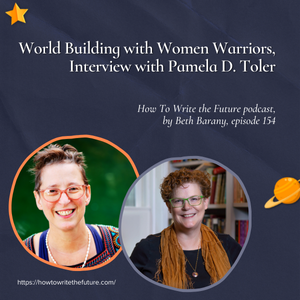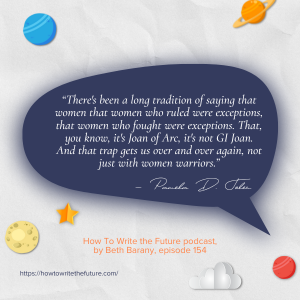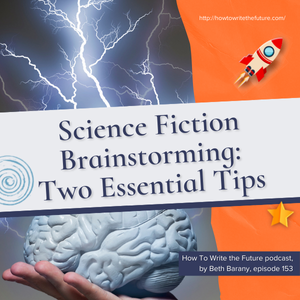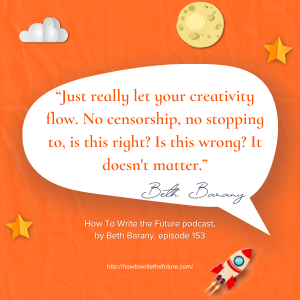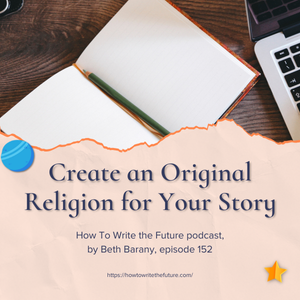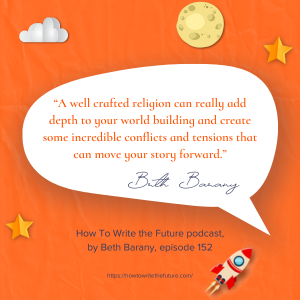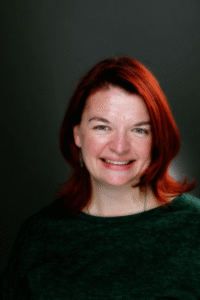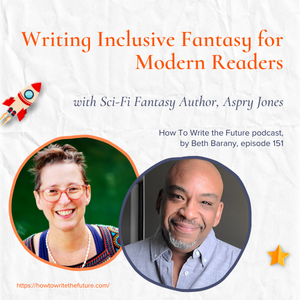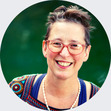Beth Barany's Blog, page 7
May 26, 2025
World Building with Women Warriors, Interview with Pamela D. Toler
World Building with Women Warriors, Interview with Pamela D. Toler
***
“There’s been a long tradition of saying that women that women who ruled were exceptions, that women who fought were exceptions. That, you know, it’s Joan of Arc, it’s not GI Joan. And that trap gets us over and over again, not just with women warriors.” — Pamela D. Toler
In this episode of How To Write the Future podcast, host Beth Barany interviews author, speaker, and historian Pamela D. Toler. Together they dive into the importance of women in history and discuss the significant challenges in documenting Women’s History and how this history can be used in your stories. They also discuss Pamela’s book, Women Warriors: An Unexpected History.
Platforms the podcast is available on Apple Podcasts | Buzzsprout | Spotify | Amazon Music| YouTube
RESOURCESSupport our work for creatives! Buy me a coffee: https://ko-fi.com/bethbarany
See also:
Ep. 146 – How Ancient Female Warriors Shape Our Future
https://writersfunzone.com/blog/2025/03/31/how-ancient-female-warriors-shape-our-future/
Women Warriors: An Unexpected History: https://books2read.com/womenwarriorstoler
GET HELP WITH YOUR WORLD BUILDING – START HERE
Free World Building Workbook for Fiction Writers: https://writersfunzone.com/blog/world-building-resources/
Sign up for the 30-minute Story Success Clinic with Beth Barany: https://writersfunzone.com/blog/story-success-clinic/
Get support for your fiction writing by a novelist and writing teacher and coach. Schedule an exploratory call here and see if Beth can support you today: https://writersfunzone.com/blog/discovery-call/
About the How To Write the Future podcastThe How To Write The Future podcast is for science fiction and fantasy writers who want to write positive futures and successfully bring those stories out into the marketplace. Hosted by Beth Barany, science fiction novelist and creativity coach for writers. We cover tips for fiction writers. This podcast is for readers too if you’re at all curious about the future of humanity.
This podcast is for you if you have questions like:
– How do I create a believable world for my science fiction story?
– How do I figure out what’s not working if my story feels flat?
– How do I make my story more interesting and alive?
This podcast is for readers too if you’re at all curious about the future of humanity.
ABOUT PAMELA D. TOLERArmed with a PhD in history, a well-thumbed deck of library cards, and a large bump of curiosity, author, speaker, and historian Pamela D. Toler writes historical non-fiction for a popular audience. She goes beyond the familiar boundaries of American history to tell stories from other parts of the world as well as history from the other side of the battlefield, the gender line, or the color bar. Toler is the author of ten books of popular history for children and adults, including Women Warriors: An Unexpected History and The Dragon From Chicago: the Untold Story of an American Report in Nazi Germany.
Website: https://www.pameladtoler.com/
Facebook: https://www.facebook.com/pamela.toler
Instagram: https://www.instagram.com/pamelatolerauthor/
LinkedIn: https://www.linkedin.com/in/pamelatoler/
Transcript for World Building with Women Warriors, Interview with Pamela D. Toler[00:00] Meet the Host: Beth Barany Welcome to How to Write the Future Podcast.I’m your host, Beth Barany. I’m an award-winning science fiction and fantasy teacher, editor and filmmaker. And I care very much about humans being able to shape their own future, both through the stories we write, as well as the way we approach the world in the way we think about our future because I believe that we humans can create positive, optimistic futures through our stories and also through how we live our day-to-day lives.
And so on that note, we are actually gonna do some history deep dive today because where we came from totally affects how we are today and how we perceive the future.
And let’s shed a light on one of my very favorite topics: women warriors.
[00:48] Introducing Special Guest: Pamela D. TolerI am so excited today to have with me a special guest, Pamela D. Toler author, and fabulous human being. Welcome Pam. or Pamela, what do you prefer, Pam? Pamela?
I prefer Pamela.
Pamela. So welcome, Pamela. I’m so glad that you’re here today.
Oh, I’m delighted to be here.
Let me read your bio for everyone. so they can learn about you.
[01:12] Pamela’s Background and WorkLemme tell you all a little bit about Pamela.
Armed with a PhD in history, a well thumbed deck of library cards and a large bump of curiosity, author, speaker, and historian, Pamela D. Toler writes historical nonfiction for a popular audience. She goes beyond the familiar boundaries of American history to tell stories from other parts of the world, as well as history from the other side of the battlefield, the gender line, or the Color Bar. Toler is the author of 10 books of popular history for children and adults, including Women Warriors: An Unexpected History, and The Dragon from Chicago, the Untold Story of an American Reporter in Nazi Germany.
Thank you so much for being here, Pamela. I’m really grateful that you took the time today and I just have to do a little showing off.
I have your Woman Warriors book. And I also have your Dragon from Chicago book.
So very exciting to have these both here. And I just wanna say it’s really fascinating to me that you took the jump from having your PhD in history to deciding to write books for the popular audiences. I’m really grateful because we need people like you who can translate, and bring these stories to life.
So I’m really grateful that you’re doing this work.
I do wanna invite everyone to check out Pamela D. Toler’s material. Her links will be in the show notes and the article that accompanies this podcast. So everyone be sure to check those out. She has a fabulous column about history. I love reading it.
[02:49] The Importance of Women’s HistoryNow I have a question for you that has been, I swear to you, plaguing me since I was a child. Which is… no pressure.
No pressure, no pressure. And because I come from a family that prized itself on being a feminist family, but also I’m a child of the seventies, and okay, I just have to tell this personal story.
When I was 16, I turned to my mom and I said, mom, how come women aren’t equal to men? I thought they were. I was brought up to believe that they were. How come they’re not? And she said to me, well, essentially social change takes a long time.
It’s takes generations. And my family had already been working on it for four generations.
I have a great-great-grandmother who was an advocate for abortion. I know that’s very controversial these days. But in the Midwest, it was illegal then, completely illegal and. and my great grandmother who was an advocate for women’s rights and her mother was the one who was also pro education for women.
And then here I am, five generations later in the seventies or eighties by then looking around, how come equality isn’t here yet? And my mom was like, she’s a realist. She’s like, well, mm-hmm. Takes a long time. And I’m like, you know, sad about that.
Yeah.
[00:03:58] Challenges in Documenting Women’s HistorySo this segues me to our first question, which is: How is it that women have been disappeared or women disappear from history?
We are 50% of the human population.
There are a lot of reasons. and at some level, the first one comes back to: what people have thought were worth telling. What were the stories that were worth telling? And if history was the story of power, then you are largely talking about men in positions of power.
And when you’re talking about a woman in a position of power, she’s always an exception for whatever reason, despite the fact that, if you look over the broad range of history, the number of women who have actually ruled, and in many cases ruled with an iron fist is extremely large, but a lot of their stories end up then getting erased or told with extreme prejudice by the people who record the history. They either remove women from history, which has happened in some really egregious ways. Hatshepsut of Egypt, where her successor simply takes their name off the monuments. So sometimes it’s literal erasure, but you also get instances where someone who’s writing the history, and a lot of times, particularly in the ancient world or even the Medieval world, we’re getting sources that are written a long time after the fact and you get a lot of trash talking. You get a lot of: there was really a man behind her pulling the strings or, she was a horrible human being, or, she didn’t exist, or she didn’t really do what the records say she did.
I was just astonished how many times, particularly in women warriors where I was reading secondary modern historians looking at older histories, making the argument that she’s a metaphor: This isn’t someone who actually was there. She’s a metaphor, or, yeah, she was there, but all this other stuff has accumulated and she didn’t really do what our actual source says she did. And not always in ancient times. There’s a woman named Amina of Hausa who was a contemporary of Elizabeth the First of England, and there are historians who said, yeah, we’re not really sure she existed. So yeah.
So it seems like it’s a lot of either overt erasure. What happened to the Egyptian? I don’t know the name for the Egyptian leader.
She’s a Pharaoh.
Pharaoh, that’s right. Thank you. My brain went blip. Or just male, dare I say, male dominated bias.
Mm-hmm.
And a woman couldn’t do that- kind of thing. Would you say, so that seems to predominate over the last, I don’t know, what, two, three, 5,000 years. it seems to have been for a long time. it’s for a long time We really start having the idea of women’s history around 1980.
That’s when women’s history as a discipline begins and historians begin looking at different sources to tell us what women’s lives were like. But also since then, you get increasing numbers of people like me going and bringing to life stories that are put in the footnotes, because a lot of times women don’t disappear completely. Their sources end up attached to their husband’s papers is one thing.
Or they just show up in a footnote. Or in more traditional writing, they get used as a horrible example: This is someone you don’t wanna be. So it’s really only about 1980 that you get a body of work that’s attempting to bring women back into the light.
That’s fascinating and also explains a lot in terms of why that material wasn’t handy when I was a child.
And the other thing, I’m sorry, you have other questions, I know not just why women get erased, but it’s also a question of what sources get kept. Yeah. Who decides what archives are worth keeping? If you’re writing women’s history, you’re often having to work around the archives in some really interesting ways because papers may not have been kept.
Yeah. That’s fascinating. ’cause you go back as far as you can to original sources, right?
More or less original sources in some cases.
Let’s segue to our next, my other very fascinating, I would say, obsession that I’ve been dabbling in for years and hope to do something very definite with at some point.
[08:39] Defining Women WarriorsI loved your book on woman warriors. I was also frustrated at the limitations of history, like we only have certain historical documents, but it sounds like you took your time to figure out who to include in your book. And so how do you define women warriors for-
I’m just gonna show it on screen for everyone. Women Warriors: an Unexpected History, beautiful cover. And, and defining turned out to be really important because despite the fact that in some ways there’s this sense that women didn’t fight. In point of fact, I had so many examples that I had to make hard choices, and I went in with a really simple definition, which was I wanted women who literally fought, that this is not women for whom fighting was a metaphor.
These were women who picked up a rock or a gun or a sword and actually fought. And that’s a pretty good definition if you’re talking about women on the front lines in any way, whether they are regular soldiers or are defending a besieged castle.
It gets less clear when you’re talking about commanders because there’s a real wide range that women commanders can take.
On the one end there is Elizabeth The First on her white horse with her silver cuirass over her gown saying, I have the weak body of a woman, but the heart of a king. And she’s sending people off to fight, but she’s not going into the field.
And at the other end, you have someone like Boudica so just stay in the British Isles, who clearly is right there, sword in hand fighting. And you’ve got everything in between.
I ended up using a modern American military definition called a “combatant commander,” where they might not necessarily be holding a weapon. After all, you don’t think that general Eisenhower wasn’t a warrior in World War II, even if he wasn’t shooting. But where they’re at the front, they’re making command decisions. They may be making tactical decisions, logistical arrangements.
So someone who is actively involved in the unwinding of a war where they’re, they are hands-on, even if they are not physically fighting with a weapon.
The other decisions that I needed to make- I really did want this to be a global history. So I took time to choose people from all around the world and from across time, beginning from the second millennium, B. C. E. I think the last person I talk aboutwas actually in the Falklands War, but she’s almost a footnote because basically I didn’t go much past World War II in looking at active combatants.
So, no. Tibet and with the Chinese invasion, but first half of the 20th century is where I end. So I also had to make those kinds of decisions.
And I didn’t want all queens and I wanted regular women. I didn’t want it to be a whole book of exceptions.
I wanted ordinary women fighting because they needed to as well. So lots of choices that had to be made.
You can’t include everyone.
On this book, what was the most surprising thing that you’ve discovered about women warriors?
Really just how many of them there were. I went in with a really fat folder of stories that I had been accumulating for 20 years, maybe before I even thought about writing the book, but I just kept finding more and it became clear that even if individual women were exceptions in their times and places, there’s a point at which: How many women do you have to have over the history of time for it to stop being an exception?
So the real thing that just got me was how many they are and how unexamined that is.
[12:51] The Trap of the Individual ExceptionSo I appreciate that you have taken your time to ask all these incredible questions, including this next one that I would love to explore with you, which is: how does the trap of the individual exception, and you’re gonna have to define what that means, contribute to the erasure of women from history?
There’s been a long tradition of saying that women were exceptions that, that women who ruled were exceptions, that women who fought were exceptions. That, it’s Joan of Arc, it’s not GI Joan. And that trap gets us over and over again, not just with women warriors. I recently was reading a book called The Swans of Harlem about black dancers in our lifetime, and how that book got triggered by Misty Copeland being treated in the news as if she were the first, as if she were an exception, and this journalist going back in, finding this group of women.
So what the trap of the exception does is it stops you from looking more broadly. It stops you from seeing who that exception built on. It stops you from seeing who else is doing something that looks a lot like that.
In the case of women warriors, the other thing that the exceptional does is if we start defining women warriors as exceptions. If you start dubbing the black women who fought in Dahomey as the black Amazons of Dahomey. If you call women who are national heroines, because they fight the Joan of Arc of wherever it is, you start creating a definition that means this is something you can’t aspire to.
This is a big heroic thing that stands apart. But you person who is having to defend your home because the Nazis are marching into Russia, you’re not really a warrior. So the real trap of the exception is not even that it means we don’t see it, but that we don’t think we can be it.
I guess we come back to that: “If you can’t see it, you can’t be it” phrase. But it’s true and it’s very much true as a historian looking, is that exceptionalism idea will get you every time.
I actually do love that you’ve tied it back to, “if you can’t see it, you can’t be it.” I know, Geena Davis uses that in her promotions.
Because it’s really true.
When I was a child, I wanted to be a doctor, or at least that’s what I told all the adults. ’cause that was what impressed them the most. But also, I had a deep desire to help people and I knew that hospital thing. But when I went looking for other doctors, women who were doctors, my parents were like, there’s this woman, It’s like they couldn’t give me very many stories when in fact there was probably a lot more stories out there that existed. They just couldn’t give them to me ’cause it wasn’t because of this whole exceptionalism thing. Yeah. So I really appreciate you explaining the whole exception because it does one more thing that I notice, which is it, it removes us from community. Oh, look at, oh, look at my grandmother who did this, and my auntie who did that, and my neighbor did this.
Like It isolates women, which I think is one of the tools that have been used to take away our power is to isolate women.
There’s a wonderful Peanut cartoon where Lucy is making a report in school and she stands up and talks about what her grandmother did in World War II and then says, you should go ask your grandmother what she did. ‘Cause it’s not just all baking cookies.
It does. It isolates you. And the whole idea that you go home and you don’t talk about it. And admittedly, a lot of men who fought in World War II also went home and didn’t talk about it. The difference is that we knew men fought in World War II, and with the exception of Rosie the Riveter, we didn’t have a real clear sense of just how much women did and what they did.
And those stories are only starting to be told now. And some of that’s because there were documents that were not able to be released until a certain number of years after the war. So that’s the reason some of the stories don’t get told, but also there’s a sense of going home and not talking about it.
And the Russian government actually told the women who were fighter pilots and bombers and mechanics in World War II not to talk about their service.
Wow.
And obviously the Bletchley Park people had signed secrecy act documents to not talk about their service. But yeah, sometimes it’s just an act of we don’t talk about this.
And that’s really too bad. That goes back to my, how come we don’t know the stories? And people are being told actively not to talk about it. And I feel like maybe because I come from a family of storytellers who tell the stories of their communities, but I feel so strongly about bringing forth these women warrior stories because women being brave, I don’t want it to be an exception.
I want it to be part of our characteristics. And that’s why I write stories about brave young women on the one hand in my fantasy worlds. And then in my sci-fi, I’ve got this lead investigator doing The Brave. And, As a matter of course. Like of course women get to be brave. Women are brave.
And so I feel like, Pamela, we could keep going for a long time.
You’re such a font of information and, I really like finding out how women were represented, but also bringing women back into the conversation and into the dialogue,by telling their stories.
Again, everyone check out Pamela’s books.
I’ll put these up on the screen and I’ll put links to these books. and I know you’re working on more projects. as we wrap up today.
[18:47] Looking to the FutureCan you speak to the future since this podcast theme is about looking toward the future and how do we wanna make our future? And of course there’s many futures, but as you look to the future, maybe, one thing that’s personal, like what you are working on, and also your wish or hope for the writers who are listening to this and those who care about the future. Those are my audience. A lot of writers listen to this.
What can you tell us about helping us write more positive, optimistic, and inclusive futures?
First. I don’t know what I’m working on right now. I’m looking so that I can’t help and right now what I really want is for us to not lose what we gained. But if we’re talking about trying to write about a more positive world, about a world where it’s assumed that women are strong and smart and doing whatever men do, and on the alternate side that men have the option of being the one to stay home and take care of children, to be caretakers too, because those two things go together.
Again, to use something that gets said a lot, but women’s rights are also men’s rights. I would say, keep that in mind with whatever you are writing about whatever future world you’re creating is that if you open the opportunities for one group, it doesn’t mean you’re closing the door for someone else.
You are not taking something away from someone else. You in the best versions of that, you are actually making the opportunities broader for everyone.
[20:22] Conclusion and Final ThoughtsI love that. That’s a great note to end on.
Oh my goodness. Thank you so much, Pamela. I just wanna encourage everyone to check out, Pamela’s resources, and I’m gonna end on this, everyone.
Write long and prosper.
Loved this episode? Leave us a review and rating here: https://www.buzzsprout.com/2012061Need instructions on how to leave a review? Go here.
***Support our work for creatives: leave a tip: https://ko-fi.com/bethbarany
***
ABOUT BETH BARANYBeth Barany teaches science fiction and fantasy novelists how to write, edit, and publish their books as a coach, teacher, consultant, and developmental editor. She’s an award-winning fantasy and science fiction novelist and runs the podcast, “How To Write The Future.”
Learn more about Beth Barany at these sites:
Author site / Coaching site / School of Fiction / Writer’s Fun Zone blog
CONNECTContact Beth: https://writersfunzone.com/blog/podcast/#tve-jump-185b4422580
Email: beth@bethbarany.com
LinkedIn:https://www.linkedin.com/in/bethbarany/
IG: https://www.instagram.com/bethbarany/
TT: https://www.tiktok.com/@bethbarany/
FB: https://www.facebook.com/bethbarany
X: https://twitter.com/BethBarany
CREDITS EDITED WITH DESCRIPT: https://www.descript.com?lmref=_w1WCA (Refer-a-Friend link)MUSIC CREDITS : Music from Uppbeat (free for Creators!): https://uppbeat.io/t/soundroll/fuzz-buzz License code: UMMKDRL02DFGKJ0L. “Fuzz buzz” by Soundroll. Commercial license: https://musicvine.com/track/soundroll/fuzz-buzz.DISTRIBUTED BY BUZZSPROUT: https://www.buzzsprout.com/?referrer_id=1994465 (Refer-a-Friend link)SHOW PRODUCTION BY Beth BaranySHOW CO-PRODUCTION + NOTES by Kerry-Ann McDadeC 2025 BETH BARANY
For more “How To Write the Future” episodes, go here.
If you’d like to invite Beth onto your podcast, drop her a note here.
 Like the work we do? Tip us! https://ko-fi.com/bethbarany
Like the work we do? Tip us! https://ko-fi.com/bethbarany
The post World Building with Women Warriors, Interview with Pamela D. Toler appeared first on Writer's Fun Zone.
May 23, 2025
A Novice Writer’s Battle: How Writing Groups Can Help You Finish Your Manuscript by Iman Llompart
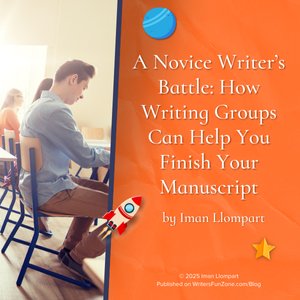 Let’s welcome back Iman Llompart as she shares with us “A Novice Writer’s Battle: How Writing Groups Can Help You Finish Your Manuscript.” Enjoy!
Let’s welcome back Iman Llompart as she shares with us “A Novice Writer’s Battle: How Writing Groups Can Help You Finish Your Manuscript.” Enjoy!
***
Most of you are probably aware of Beth Barany and her newsletter, and if you’re reading this post on her page, you definitely should be.
I recently interviewed her. We talked about her background, why she writes, and what keeps her going even during times of confusion, which, believe it or not, still happens despite her long career in fiction writing.
This revelation should offer some comfort to new writers, especially during those moments of despair when you just want to rip your hair out and quit.
Beth Barany: A Creative FoundationIman Llompart: Thank you so much for meeting with me today, Beth. To start, could you share a little about your background?
Did you grow up in a family that encouraged reading and creativity?
Beth Barany: Absolutely. Reading was huge in my family from day one. My mom even tells the story of reading Mary Poppins while she was in labor with me!
Both my parents read to me and my siblings constantly. Creativity was a big deal–there were always arts and crafts, cooking projects, and a strong encouragement for imagination.
Iman Llompart: Do you still engage in those creative outlets today?
Beth Barany: Yes, though less frequently.
I still love to cook and I create art–doodles, collages, and paintings. My office is filled with pieces I’ve made.
These days, though, my main creative outlets are writing fiction and doodling.
Iman Llompart: When did you start writing?
Beth Barany: My first story was about our cats, co-written with my brother when I was around eight.
Later, I compiled a little anthology with my siblings and started journaling around age thirteen.
A wonderful creative writing teacher encouraged me early on.
I started my novel Henrietta the Dragon Slayer when I was nineteen–though I didn’t return to it seriously until my thirties.
Writing as a Lifelong CallingIman Llompart: Why do you write?
Beth Barany: Writing is how I understand myself and the world.
It’s like dreaming awake–an emotional outlet and a deep creative expression.
Fiction allows me to create worlds and characters that didn’t exist but that I needed to see, especially strong girls and women going on adventures.
Without writing, I honestly feel like half a person. It’s not just something I do–it’s part of who I am.
Dealing with Confusion and DoubtIman Llompart: How do you keep going when doubt creeps in?
Beth Barany: Community and accountability partners. I’ve never worked in isolation.
Even now, I rely on critique groups and writing buddies–including my husband–to keep me moving forward.
Having someone waiting for my work makes a huge difference, especially during those messy, confusing middle parts of writing when doubt really hits.
Iman Llompart: Did you ever think about quitting writing altogether?
Beth Barany: Never. I might step away when I’m tired or overwhelmed, but quitting has never crossed my mind.
I love my characters and their stories too much. When things get tough, I know it’s just time for a break–not to give up.
Iman Llompart: Have your fears changed over the years?
Beth Barany: Definitely.
Early on, it was wondering if I was even any good.
Winning an award for Henrietta the Dragon Slayer helped build my confidence.
Now my focus is on making sure the story connects with readers.
Doubts still show up, but they’re easier to manage because I know how to problem-solve my way through them.
Final ThoughtsBeth’s insights surprised and inspired me.
What really stood out was that even after all these years, she still leans on writing groups and accountability buddies to stay motivated.
She didn’t move on from that system–she stuck with it because it worked.
It just goes to show: we all have rituals that help silence the inner critic, that annoying voice telling us our ideas are trash.
And no matter how much experience we gain, finding and protecting those supportive practices is crucial.
When self-doubt creeps in (and it will), it’s those habits that can save your story and your sanity.
***
About The Author Iman Llompart is a Spanish American writer based in Dubai, raised in Mexico, and currently navigating the final stages of the rough draft of an epic fantasy romance novel. Passionate about storytelling and the writing process, Iman understands the struggles that many novice writers face—the self-doubt, the isolation, and the challenge of completing a book. Through blog posts, insights, and personal experiences, Iman seeks to remind fellow writers that they are not alone on this journey.
Iman Llompart is a Spanish American writer based in Dubai, raised in Mexico, and currently navigating the final stages of the rough draft of an epic fantasy romance novel. Passionate about storytelling and the writing process, Iman understands the struggles that many novice writers face—the self-doubt, the isolation, and the challenge of completing a book. Through blog posts, insights, and personal experiences, Iman seeks to remind fellow writers that they are not alone on this journey.
When not writing, Iman enjoys reading, deep-diving into writing sessions and lessons, and watching book-based shows and movies. Occasionally, she also braves the unpredictable world of dating—an adventure that sometimes feels more daunting than crafting an entire novel. With a love for words and a mission to inspire, Iman hopes to one day share her finished manuscript and continue helping others through the power of storytelling.
Instagram @imanllompart • Instagram photos and videos
The post A Novice Writer’s Battle: How Writing Groups Can Help You Finish Your Manuscript by Iman Llompart appeared first on Writer's Fun Zone.
May 20, 2025
How Do I Transfer Rights to My Kindle Direct Publishing Account After My Death? by Kelley Way
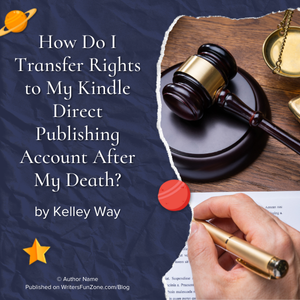 Let’s welcome back monthly columnist Kelley Way as she shares with us “How Do I Transfer Rights to My Kindle Direct Publishing Account After My Death?” Enjoy!
Let’s welcome back monthly columnist Kelley Way as she shares with us “How Do I Transfer Rights to My Kindle Direct Publishing Account After My Death?” Enjoy!
***
There’s a lot to consider when putting an estate plan together. For self-published authors, rights to their Kindle Direct Publishing (KDP) account should be on the list.
Otherwise, your account will languish while the estate gets sorted out, and rights to your account will very likely go to a person or people with no idea what to do with it.
The first step is deciding who you want your account to go to.
This could be a trustee or “literary executor,” whose job is to manage your copyrights on behalf of your chosen beneficiary.
Alternatively, you could cut out the middleman and have the beneficiary be in charge of the account.
If you choose the second option, make sure the beneficiary knows how to manage your copyrights and market your books.
So, once you know who you want your account to go to, how do you get it to them?
In doing my research for this article, I did not see anything that suggested Amazon lets authors set up a designated beneficiary for their Kindle Direct Publishing account.
However, they will honor any transfers made through a will, trust, or probate proceeding.
Transfers Via A WillThis is the most straightforward, and probably easiest, of the three options. If you state in your will who has rights to your KDP account, the recipient just needs to create their own account and provide Amazon with a death certificate and a copy of the will.
They may also be asked to provide some identification to prove that they are who they say they are. Amazon will take it from there.
Transfers Via A TrustThis one is a little more work, because you need to put your KDP account in your trust while you are still alive.
However, if you do so, your trustee can take over the account with minimal fuss, and the transfer to the beneficiary or beneficiaries can take place by providing a death certificate and a copy of the trust.
Side note: While your account can be placed in your trust, you may need to do some legwork to avoid negative tax consequences, particularly for income received after death.
Check KDP’s policies and talk to your tax advisor to be safe.
Transfer Via A ProbateThis is the option with the most hassle factor (for everyone else — you’ll be gone, so it won’t be your problem at this point).
If the estate has to go through a probate, then your account will sit there until the court appoints an administrator, who may or may not do anything with it once they have the authority to access it.
From there it can’t be transferred to the legal heir(s) until the probate is closed, which can take quite some time in California.
Your account will still be passed on, but it won’t be quick and it won’t be easy.
Of course, for those who don’t like any of these options, there is one more way you could make this work: setting things up so the royalties go to a joint account or trust account.
This way, Amazon can continue to deposit the money, and someone can continue to collect it, without having to do much with the account itself.
Personally, I consider this more of a stop-gap than an actual solution, since ownership of the account will need to be dealt with at some point or another.
Still, it gives people some time and flexibility while dealing with the general estate.
If you have questions or would like to learn more about Kindle Direct Publishing and incorporating your books into your estate plan, you can contact me at kaway@kawaylaw.com.
***
Want to read more articles like this one Writer’s Fun Zone? Subscribe here.
***
ABOUT THE AUTHORKelley Way was born and raised in Walnut Creek, California. She graduated from UC Davis with a B.A. in English, followed by a Juris Doctorate. Kelley is a member of the California Bar, and an aspiring writer of young adult fantasy novels. More information at kawaylaw.com.
The post How Do I Transfer Rights to My Kindle Direct Publishing Account After My Death? by Kelley Way appeared first on Writer's Fun Zone.
May 19, 2025
Science Fiction Brainstorming: Two Essential Tips
Science Fiction Brainstorming: Two Essential Tips – How To Write the Future podcast, episode 153
***
“Just really let your creativity flow. No censorship, no stopping to, is this right? Is this wrong? It doesn’t matter.” — Beth Barany
In this How To Write the Future podcast episode, host Beth Barany answers a question from a listener and shares her advice for those in the brainstorming stages of their novel. In “Science Fiction Brainstorming: Two Essential Tips,” Beth highlights the importance of letting your creativity flow and shares about her book, Plan Your Novel Like A Pro, co-written by Ezra Barany, might be a great next step.
Platforms The podcast is available on Apple Podcasts | Buzzsprout | Spotify | Amazon Music| YouTube
RESOURCESGET HELP WITH YOUR WORLD BUILDING – START HERE
Free World Building Workbook for Fiction Writers: https://writersfunzone.com/blog/world-building-resources/
Sign up for the 30-minute Story Success Clinic with Beth Barany: https://writersfunzone.com/blog/story-success-clinic/
Get support for your fiction writing by a novelist and writing teacher and coach. Schedule an exploratory call here and see if Beth can support you today: https://writersfunzone.com/blog/discovery-call/
About the How To Write the Future podcastThe How To Write The Future podcast is for science fiction and fantasy writers who want to write positive futures and successfully bring those stories out into the marketplace. Hosted by Beth Barany, science fiction novelist and creativity coach for writers. We cover tips for fiction writers. This podcast is for readers too if you’re at all curious about the future of humanity.
This podcast is for you if you have questions like:
– How do I create a believable world for my science fiction story?
– How do I figure out what’s not working if my story feels flat?
– How do I make my story more interesting and alive?
This podcast is for readers too if you’re at all curious about the future of humanity.
Transcript for Science Fiction Brainstorming: Two Essential Tips [00:00] Introduction and Podcast OverviewHey everyone. Welcome back or welcome to my podcast, How To Write The Future. I’m in a little bit different setting than normal, trying something different. This podcast is for people who want to write positive, optimistic futures into their stories. I am a writing teacher, writing coach, career coach for creative entrepreneurs and an award-winning science fiction and fantasy writer.
Just so you know, I’m not coming from some theoretical perspective. I’m actually coming from a lived perspective.
[00:34] Client Question: Brainstorming a NovelSo today I have a question from one of my clients. I’ve been asking all my writing clients for their questions that might be good for the podcast.
Rodrigo’s question is essentially: what advice would you give someone who’s brainstorming their novel? They’re at the brainstorming stage for their novel.
In his case, it’s science fiction novel. But of course this will go for fantasy novel as well, or any novel.
I specialize in helping science fiction and fantasy writers because it’s what I write and it’s what I love.
So he said, What advice would you give to someone who’s at the brainstorming stage, and they want to start writing?
They wanna start writing their story, but there’s so many options they’re still weighing so many different things. Especially he said when it comes to technology, because he’s writing a futuristic story. Lots of choices and lots of options. It can be overwhelming.
I basically said, oh, so world building is a lot, right?
You could spend all your time world building. And never get to your writing.
Or you might feel really impatient about all the world building and you just wanna get to your writing. And also, you might be overwhelmed by all the different ideas that you have for your story.
All the different directions things could go.
So what do you do? What do you do with all of that? And I’ve been faced with this many times.
[01:58] Tip 1: Timed Writing SessionsI wanna give you one tip on how to, number one, get started, and number two, get organized.
Those two things can go a long way.
So if you are brainstorming or you wanna be brainstorming on your story world for your science fiction and fantasy novel, how do you begin? Where do you begin?
And I would say: You begin with short timed writing.
And this will allow you to have a container, like a playground, a structure where you can put all of your ideas in.
I wanna give you the permission slip to put all of your ideas down on paper.
So the first assignment is basically to free write, brainstorm without any censorship for at least 20 minutes.
So set your timer for 20 minutes and allow yourself to follow whichever of the ideas comes to mind. Follow that as far as you can go. Or you might be somebody who really just needs to get out all the ideas. Maybe you have 10 different competing ideas for your story, or 20 or 50, or maybe just five.
Then use your brainstorming time, your timed 20 minute session to write everything down.
And very importantly, just really let your creativity flow. No censorship, no stopping to, is this right? Is this wrong? It doesn’t matter.
In fact, all that censorship- internal censorship and internal critic and internal editor- is often what stops authors from just moving forward and writing it all down.
So that’s my main tip for you is to use timed writing sessions and get all of your ideas on the page.
Now, if one 20 minute session isn’t enough, guess what? Do another and then do another and do another. And spend your time, your writing time, just with getting your ideas all down.
[03:47] Tip 2: Organizing Your IdeasNow, once you’ve done with that, and I want us to talk about organization.
Once you’re done writing all your ideas, give yourself time to do it.
Give yourself a few days, a few weeks, a few months. It really doesn’t matter when, especially for first time novelists, there’s no rush, there’s no race. This is for you to put your ideas on the page, and then secondly, for organization.
When you’ve had a clear mind, come back. Give yourself some space from what you’ve written. Now come back and notice and reread your work. Take your time. Reread all of your brainstorms.
Notice there’s probably a pattern in there. There’s probably some ideas that you might have been repeating over and over, or some things that get you more excited than others.
What I want you to do is organize this material in terms of the things that really excite you.
And then notice you can break it down even further. Maybe you’ve already been describing things about your characters, things about your story world, things about your plot, and put those into three categories.
I use Scrivener for this. I highly recommend Scrivener. I’m not an affiliate, I’m just a hardcore, longtime user. Really love them. There are other tools out there where you can organize your work.
Notion is good. I hear some people use Notion as well. I use Notion for other things, but not for organizing my stories.
[05:07] Conclusion and Additional ResourcesAlright, that is it this week for you everyone. Please brainstorm your story, give yourself full permission to do it, and then with a fresh pair of eyes, look at your work and organize it and discern for yourself.
Where is the excitement? What have you put down into your brainstorm?
And that will give you a personalized roadmap on what to do next.
[05:29] A resource for youNow if you are looking for even more tips on how to get organized to brainstorm and plan and prepare to write your novel, then I highly recommend that you check out my book that I co-wrote with my husband, Ezra Barany.
We wrote Plan Your Novel Like A Pro. Yes, this is an ad. Check out Plan Your Novel Like A Pro.
It is designed to help you plan your entire novel in bite-sized bits. I hope you enjoy that. Get writing. That’s the most important thing is just get writing without censorship and you will find your way through.
Alright everyone, write long and prosper.
Loved this episode? Leave us a review and rating here: https://www.buzzsprout.com/2012061Need instructions on how to leave a review? Go here.Support our work for creatives: leave a tip: https://ko-fi.com/bethbarany
***ABOUT BETH BARANYBeth Barany teaches science fiction and fantasy novelists how to write, edit, and publish their books as a coach, teacher, consultant, and developmental editor. She’s an award-winning fantasy and science fiction novelist and runs the podcast, “How To Write The Future.”
Learn more about Beth Barany at these sites:
Author site / Coaching site / School of Fiction / Writer’s Fun Zone blog
CONNECTContact Beth: https://writersfunzone.com/blog/podcast/#tve-jump-185b4422580
Email: beth@bethbarany.com
LinkedIn:https://www.linkedin.com/in/bethbarany/
IG: https://www.instagram.com/bethbarany/
TT: https://www.tiktok.com/@bethbarany/
FB: https://www.facebook.com/bethbarany
X: https://twitter.com/BethBarany
CREDITS EDITED WITH DESCRIPT: https://www.descript.com?lmref=_w1WCA (Refer-a-Friend link)MUSIC CREDITS : Music from Uppbeat (free for Creators!): https://uppbeat.io/t/soundroll/fuzz-buzz License code: UMMKDRL02DFGKJ0L. “Fuzz buzz” by Soundroll. Commercial license: https://musicvine.com/track/soundroll/fuzz-buzz.DISTRIBUTED BY BUZZSPROUT: https://www.buzzsprout.com/?referrer_id=1994465 (Refer-a-Friend link)SHOW PRODUCTION BY Beth BaranySHOW CO-PRODUCTION + NOTES by Kerry-Ann McDadeC. 2025 BETH BARANY
***
For more “How To Write the Future” episodes, go here.
If you’d like to invite Beth onto your podcast, drop her a note here.
 Like the work we do? Tip us! https://ko-fi.com/bethbarany
Like the work we do? Tip us! https://ko-fi.com/bethbarany
The post Science Fiction Brainstorming: Two Essential Tips appeared first on Writer's Fun Zone.
May 16, 2025
A Navigation Chart For Daily Practice by Stephen Weinstock
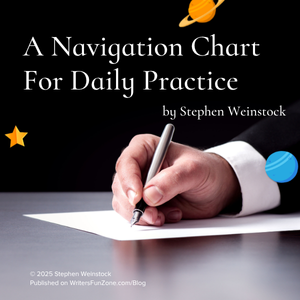 Today we welcome a new guest writer to Writer’s Fun Zone, Stephen Weinstock who is stopping by to chat with us about “A Navigation Chart For Daily Practice.” Enjoy!
Today we welcome a new guest writer to Writer’s Fun Zone, Stephen Weinstock who is stopping by to chat with us about “A Navigation Chart For Daily Practice.” Enjoy!
***
Some of us face down deadlines.
Some of us yearn for regular writing output.
And some of us just fear staring at a blank page.
In any case, we’d all appreciate a writing process that paves a smooth path to productivity.
Even just to spit out that messy first draft. I’ve used such a method for fiction writing for years.
I don’t swear by the specifics of my method for everybody, but once I present it, my point is for you to create a similar one for your needs.
1001 Nights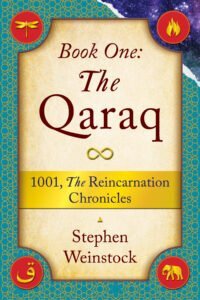 For years I have been writing a fantasy series called 1001, The Reincarnation Chronicles.
For years I have been writing a fantasy series called 1001, The Reincarnation Chronicles.
The premise is that a group of ten characters meet in the present day, have the ability to remember their past lives, and discover they have been interacting lifetime after lifetime.
In a moment of insanity, I chose to model the structure after the 1001 Nights, and have the series continue for 1001 chapters, each containing a past life story, a la Scheherazade.
My strength is my imagination, and I can transform and integrate any morsel from my life or research into one of these past life stories.
But I still faced writing each one of these tales, as well as a chapter’s material from the characters’ present day lives.
I needed some method to move the work along happily.
The Methods I UseI use a chart that covers everything I need for each chapter. Some of the items on the chart are things you find on many fiction checklists:
external character traits like gesture and physique,inner traits like temperament and beliefs,the pertinent back story for the character in the story.a major item on the chart is simply the slice of that novel’s chapter outline.Yes, the chart doesn’t replace big picture outlining for the book. I love making a detailed outline, so there’s a lot of information for that item.
same with research; that comes first or as needed later.Most of the other items on the chart are hidden structures that appear in each chapter throughout the series.
I inherited this crazy notion from my days as a modern composer; a lot of us music geeks love hidden structures.
Listen to a scene from Alban Berg’s Wozzeck and one scholar will say the musical form is based on a minuet, but your ears hear nothing resembling a minuet.
It’s a hidden structure that Berg used to generate material and represent some idea in the narrative.
Joyce used similar formal ideas in each chapter of Ulysses: the hour of the day, the episode from The Odyssey, the literary style.
He used a chart for this puzzle; I’ve seen it — it’s seven by four feet!
I was inspired by Berg and Joyce, but use different categories for my hidden structures.
Use your own thing, something totally different from hidden structures, but choose something that inspires ideas readily.
The Development GameFor me, it’s a game, nothing necessary for the casual reader to comprehend, but enormously useful to me in developing material for the chapter.
Here’s some examples.
Every chapter contains a reference to one of the 1001 Nights.For example, Sinbad’s compulsion to seek the next adventure, even though they usually end in disaster.
Sometimes these references just generate an image (a tidal wave), sometimes a minor character (a yapping lapdog), and sometimes the narrative concept of the entire chapter (an island turning into an enormous bird and flying off with the hero).
I took the frame tale of the 1001 Nights, the Scheherazade story, and divided it into 1001 small phrases, each three to ten words long.In the present day scene of each chapter, one of these phrases has to appear. “Obliged to stay there for three days” appears disguised as “You have to stay here for at least three days.”
Since the series is about reincarnation, there are pairs of lifetimes where one character creates an action on another character (A murders B), and a future inverted pair of lifetimes where that karma is resolved (B forgives A).In these linked stories, this karmic event influences the narrative somehow — another hidden structure.
My chart tracks over a dozen of these hidden structures.
Some of them dovetail easily with visible character and action choices. Some of them are as obscure as can be.
Some of them suggest quirky details or unexpected plot twists.
Once I have filled out all the items in the chart, I organize them in order of what goes where in that chapter, tweaking how they will support the action and dialogue.
Somewhere in that process, I have an AHA moment of recognizing the main idea or action for the chapter.
The beauty part: it’s easy to fill out, and after I organize the answers, I have a detailed outline.
Writing it up follows naturally because I’ve done a lot of thinking and created a lot of inspiration.
With this form, I’ve generated 537 chapters so far.
But my true message is to invent your own, self-motivating methodology for generating material.
As a self-taught writer, it was only later that I learned ‘traditionally accepted’ methods, so I created something along the way.
As an independent writer, who needed motivation and discipline with no support system to help me, inventing a system for daily practice was crucial.
As an author of a long form series that tested my stamina, discovering a reliable technique was a godsend.
I don’t expect anyone to use my chart literally (especially those hidden structures).
But I encourage you to experiment with your own chart for daily practice, and discover unique categories that serve your particular work.
Perhaps your chart or checklist changes from book to book, or chapter to article. Here’s the basic wisdom in this method: it breaks things down so you don’t freak out at the mountain you’re climbing, but focus on the steps up the mountain path.
***
About The Author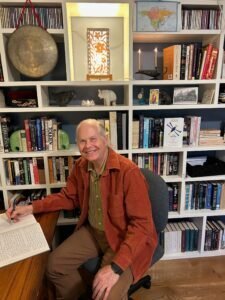 Stephen Weinstock’s epic fantasy series, 1001: The Reincarnation Chronicles, won Finalist in the Best Books Award for Multi-Cultural Fiction. Originally a theater and dance composer, he resides in New York’s Hudson Valley, determined to finish the genre-bending series before his next reincarnation as a temple elephant. Free gifts with the Maqaraqan, newsletter of The Reincarnation Chronicles www.qaraqbooks.com/join
Stephen Weinstock’s epic fantasy series, 1001: The Reincarnation Chronicles, won Finalist in the Best Books Award for Multi-Cultural Fiction. Originally a theater and dance composer, he resides in New York’s Hudson Valley, determined to finish the genre-bending series before his next reincarnation as a temple elephant. Free gifts with the Maqaraqan, newsletter of The Reincarnation Chronicles www.qaraqbooks.com/join
Stephen’s books: www.qaraqbooks.com/books
Website: www.qaraqbooks.com
Facebook: https://www.facebook.com/SWeinstock1001
Instagram: https://www.instagram.com/drstephenw_
LinkedIn: https://www.linkedin.com/in/stephen-weinstock-04a70b90
The post A Navigation Chart For Daily Practice by Stephen Weinstock appeared first on Writer's Fun Zone.
May 13, 2025
Five Methods For Giving Romantic Heroines Agency (Brought to you by Emily Henry) by Laurel Osterkamp
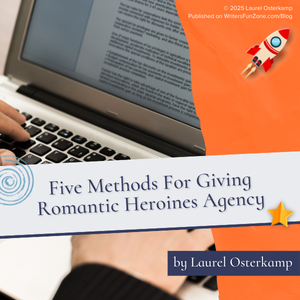 Let’s welcome back Laurel Osterkamp as she shares with us “Five Methods For Giving Romantic Heroines Agency (Brought to you by Emily Henry).” Enjoy!
Let’s welcome back Laurel Osterkamp as she shares with us “Five Methods For Giving Romantic Heroines Agency (Brought to you by Emily Henry).” Enjoy!
***
Thousands of readers on Bookstagram will tell you: spring means a new Emily Henry novel. Personally, I’m hooked.
Her work inspired me to write contemporary romance and has lended the genre a more literary flair.
Currently, I’m reading Great Big Beautiful Life, and I admire how her writing blends tropes with unpredictability.
Emily Henry crafts female main characters who desire love but maintain strong agency.
They are multidimensional and relatable, balancing vulnerability with strength.
For examples of female protagonists who yearn for relationships while remaining fiercely independent, look to Emily Henry’s novels.
Internal Motivations and an Emotional Core: Harriet from Happy PlaceIn Emily Henry’s 2023 release, Happy Place, Harriet is struggling in every area of her life.
She’s unsure if she wants to be a doctor.
Her parents don’t understand her and she doesn’t understand them. There’s a rift in her female friendships.
And she secretly broke up with her true-love, Wynn.
So, she must decide what she truly desires, both from life and from love.
Is it companionship, validation, or a sense of belonging?
By pinpointing Harriet’s deepest emotional needs, Emily Henry creates a foundation for her character’s yearning that’s authentic and relatable.
Independence and Strength Outside of Romance: Alice from Big, Beautiful LifeI’m a little more than halfway through Henry’s most recent novel, Big Beautiful Life, but I’ve read enough to know that Alice is super-independent and strong.
Emily Henry does a great job giving Alice a career, hobbies, friendships, and personal goals, showing her as a person with passions, talents, and ambitions that define her identity.
Alice has achieved a lot as a magazine writer, and she navigates the world on her own terms.
Her independence doesn’t diminish her desire for love; instead, she can stand tall even when her heart is vulnerable.
Alice is capable and self-sufficient; her longing for connection becomes more poignant because it’s rooted in a desire to share her life, and not just to escape loneliness.
Vulnerability Balanced with Resilience: Daphne from Funny StoryDaphne, from the 2024 release Funny Story is a great example of balancing vulnerability with resilience.
At the beginning of the novel she’s been dumped by her fiance and is sort of closed off in how she relates to people.
Yet, Daphne is both yearning and strong, capable of expressing her feelings without growing fragile or dependent.
Emily Henry gives Daphne moments of tenderness, doubt, and longing, but also the capacity to face challenges head-on.
Partnership of Equals: Nora from Book LoversEmily Henry begins her 2022 release Book Lovers with her main character Nora explaining that she’s not the plucky, perky type of gal who men scramble to be with.
Rather, she’s intense and driven–the type that men break up with once they’ve found their plucky, perky dream girl.
But Nora is nothing if not capable; her agency is evident in all her interactions and decisions.
Nora initiates conversations, sets boundaries, and expresses her needs clearly, refusing to settle for less than she deserves.
Once Nora meets Charlie, she is an active participant in her own love life. She is Charlie’s equal.
A Character Arc of Personal Growth: Poppy from People We Meet on VacationIn 2022 Emily Henry released People We Meet on Vacation, which contains her most flawed heroine, Poppy.
Poppy can be oblivious and she’s not always honest with others or with herself. More importantly, she realizes she’s not happy.
But, since Poppy is a nuanced protagonist, she evolves, transforming her experiences into wisdom and self-awareness.
Poppy’s desire for love leads her to confront her fears, break old patterns, and redefine her understanding of happiness.
Emily Henry makes Poppy’s journey satisfying and authentic, demonstrating that love and self-empowerment are not mutually exclusive but can coexist and even enhance each other.
Creating a female main character who yearns for love yet retains her strength and agency involves understanding her internal desires, establishing her independence, balancing vulnerability with resilience, ensuring her relationships are partnerships of equals, and allowing her to grow through her journey.
When these elements are woven together thoughtfully, she’ll resonate deeply with readers, offering a compelling blend of longing and empowerment.
That’s why Emily Henry’s protagonists inspire readers to believe in their capacity for love while remaining true to their authentic selves.
***
About the Author
Laurel Osterkamp is from Minneapolis, where she teaches and writes like it’s going out of style. Her short fiction has been featured in Abandon Journal, Idle Ink, Tangled Locks Literary Journal, Bright Flash Literary Journal, and The Metawoker, among other places. Her new novel, The Side Project, was released on November 13th by The Wild Rose Press.
Website – https://laurellit.com
Facebook – https://www.facebook.com/authorlaurelosterkamp
BookBub – https://www.bookbub.com/profile/laurel-osterkamp
Instagram: Laurel Osterkamp (@laurel_osterkamp) • Instagram photos and videos
The post Five Methods For Giving Romantic Heroines Agency (Brought to you by Emily Henry) by Laurel Osterkamp appeared first on Writer's Fun Zone.
May 12, 2025
Create an Original Religion for Your Story
Create an Original Religion for Your Story – How To Write the Future podcast, episode 152
***
“A well crafted religion can really add depth to your world building and create some incredible conflicts and tensions that can move your story forward.”
In this How To Write the Future podcast episode, host Beth Barany discusses creating original religions in fiction, emphasizing the importance of core beliefs, rituals, and the impact of religion on characters and society. She encourages writers to mix cultural influences and consider how religion shapes their story’s world and conflicts. Beth also shares how her World Building Workbook for Fiction Writers can help writers and why her one one-on-one writer support program may be beneficial for you.
Platforms The podcast is available on Apple Podcasts | Buzzsprout | Spotify | Podcast Addict | Amazon Music| YouTube
RESOURCESGET HELP WITH YOUR WORLD BUILDING – START HERE
Free World Building Workbook for Fiction Writers: https://writersfunzone.com/blog/world-building-resources/
Sign up for the 30-minute Story Success Clinic with Beth Barany: https://writersfunzone.com/blog/story-success-clinic/
Get support for your fiction writing by a novelist and writing teacher and coach. Schedule an exploratory call here and see if Beth can support you today: https://writersfunzone.com/blog/discovery-call/
About the How To Write the Future podcastThe How To Write The Future podcast is for science fiction and fantasy writers who want to write positive futures and successfully bring those stories out into the marketplace. Hosted by Beth Barany, science fiction novelist and creativity coach for writers. We cover tips for fiction writers. This podcast is for readers too if you’re at all curious about the future of humanity.
This podcast is for you if you have questions like:
– How do I create a believable world for my science fiction story?
– How do I figure out what’s not working if my story feels flat?
– How do I make my story more interesting and alive?
This podcast is for readers too if you’re at all curious about the future of humanity.
Transcript for Create an Original Religion for Your Story[00:00] Introduction and Host WelcomeHey everyone. Welcome to How to Write the Future Podcast. I’m your host, Beth Barany. I’m a creativity coach for science fiction and fantasy writers, editor, teacher, speaker, and also coach for women filmmakers. I love doing this podcast because I love answering your questions.
[00:19] Listener Question: Creating Original ReligionsSo I have a question this week from Jasper Ezekiel who works for me and is also a client and is a speculative fiction writer. His question is about religion. He says it’s his belief that religion is wrapped up in everything related to culture. So he’s really curious: How do we create a fictional religion that is original?
That’s such a great question. Thanks for your question, Jasper.
[00:49] The Intersection of Religion and CultureI agree with you that it is very hard to separate religion from culture and from the culture that we were steeped in from day one. And it’s not just the culture of our family, but of course it is the broader culture at large and even maybe the intersection of different cultures that influence us from day one.
So how do we go about creating an original religion?
I guess my short answer is that ultimately there’s nothing original under the sun. All the elements and ingredients are there, but it’s how you put them together that make them feel original.
And my analogy is with cooking. My father was a great cook and he would put out the ingredients. And if you look at the ingredients, you’re like, oh, I think he’s gonna make an Italian dish. But then there’s that one spice sitting on the side that I didn’t recognize, and then when he added it to the meal, it’s wow, this tastes like Indian. And Italian. Oh, it’s a fusion dish.
[01:44] A Value SystemSo that’s how I see religions. At base, all religions have something that they all share, which is a value system. According to Michael Kilman and Kyra Westrom and in their book Build Better Worlds, and I interviewed Michael and I did a bunch of little episodes, a little series about his book, Build Better Worlds.
He talked about how religion, it’s about essentially pure and impure. Good and bad. What is good? What is bad?
And that is subjective. According to the culture. According to the religion. Religion steeps in everywhere in culture.
And it’s influence is going to be overt or covert in one form or another everywhere.
Now, if you are as a fiction writer, as a science fiction, a fantasy writer, how do you go about doing something that feels original. ’cause it is possible. It is possible.
[02:38] Tips for Developing Fictional Religions: Core Value/BeliefSo I have some tips for you today.
Something to consider is: What is the core value or belief of your main character?
Just start with your main character. And then to add complexity, ask that of all of your secondary characters as well, and even tertiary characters.
What’s gonna also make your story world feel complex and interesting is that perhaps even though people share the same religion, they may be liberal versus conservative inside of that religion, and so you can define that as well.
Or some people might be religious in name only, just so they get the privileges of that religion.
[03:19] Religion Origins and Guiding Moral PrinciplesSo what do your followers believe about the origin of their world, of their universe? And what are the moral principles that guide their actions?
And I would interview each one of your speaking characters and even non-speaking characters to figure that out.
[03:35] Practices and RitualsNext, when you think about your religion, you wanna think about the practices and the rituals.
What do people do to worship or connect to the divine in your story?
What sacred ceremonies mark important life events?
And this is something I’ve thought about in my Janey McCallister sci-fi mystery series, actually wrote a passage about the end of life ritual.
What does their funeral rites look like? And that was fun to describe. It was something different that I had never seen in the cultures that we live with, but it’s something that I had daydreamed about. So I put that into the story.
[04:10] Structure and OrganizationWhat is the structure and organization of the religion?
Are there leaders? Are there co-leaders? Is it a very flat organization?
If you look at human history, our religions have all tended to have leaders of one kind or another. Whether that was a shaman or a wise woman, or a pope, or imam, or a rabbi. Or a priest. Or a preacher.
You can see in a lot of the religions that we’ve had over the last 2000 plus years, are mostly male focused, but then you’ve got other religions, animistic religions, pagan religions that might be organized differently.
[04:47] Leadership and Passing on KnowledgeWho are the leaders and how is religious knowledge passed down? Do people go to a seminary, a school? Are people in small learning circles? Is it just a legacy that’s handed down through the family?
So that’s also something very interesting to think about.
[05:03] Religion’s Impact on Characters and SocietyAnd then on the day to day, how does religion impact the daily life of your main characters? Are there certain ways that people greet each other that stem from religion? Are there certain rituals or prayers that need to be done throughout the day? Are there impacts when different religious groups come together, either accidentally or on purpose? And what about non-believers? What about people who do not adhere to the religion in your story? What happens to them? What are the consequences?
[05:32] Religion’s Evolution in Your StoryAnother thing to think about is what is the evolution of this religion in your story? Did it start out one way and evolve into a new form throughout the historical period?
And then on the day on page one, when we meet your main character, the way they practice religion or interact with the religion might be very different than their ancestors.
[05:52] Your Heritage: Mix and MatchAnd then lastly, especially for the science fiction writers, there’s a lot of ways that you can come at developing religion that feels fresh and new. And in my conversation with Jasper, we’re talking about our own heritage and how our ancestors came from different places and how we might be drawing inspiration from those places.
And so my advice is to mix and match. If you’re drawn to certain religious practices from different groups, then what would it be like to put them together in a way that is your own?
[06:21] How Religion Affects the Culture and Vice VersaSo when you think about designing a religion for your story, you wanna consider how religion is also going to affect politics and the power structure, the social customs and taboos, even art and architecture and education and knowledge transmission, what can be transmitted and what is taught in schools.
And so coming back to your own life, think about the world’s religions that you may have been exposed to and how can they impact what you wanna create?
And if you wanna deviate and come up with something original, something different than the religion that you were brought up with, how do you do that in a way that is respectful to other beliefs?
And if you are going to appropriate real beliefs, are you doing it in a way that is respectful, honors the historical evolution of that religion?
And when you create your own religion: How do you make it believable for the reader, and of course, for your characters?
[07:14] Religion’s Impact on Your Story World and PlotAnd of course from a plot level, in what way can your story’s religion create some interesting plot possibilities and character conflicts?
A well crafted religion can really add depth to your world building and create some incredible conflicts and tensions that can move your story forward. And if your story focuses on morals and values and religion, then it’s gonna be doubly important that you understand where your religion came from, who shapes it, how people operate inside of it, and how it impacts them and your story.
[07:46] ExampleNow before I wrap up, I just wanna give one example that comes top of mind for me for an incredible religion in science fiction and fantasy. And that’s the Bene Gesserit in the Dune series. That is a religious order that Frank Herbert created that combines mysticism with political power and just so beautifully with lots of layers and of course, secrets and lineages, and it’s just so wonderful.
[08:11] Sacred Objects, Prophecies, and TechnologyAnd that brings me to some other elements to consider in your religious design, which is sacred objects or substances like the spice melange in Dune.
And, as we saw also with the Bene Gesserit and Dune, the intersection of technology and faith, they did that really well.
[08:27] Power StrugglesAnd like in Dune, we see the different power struggles because of the religious factions and the tension between scientific beliefs and traditional religious beliefs. And then of course there’s always the fabulous personal conflicts.
When your character questions their belief, that’s such a powerful one.
Especially if you’re writing a story where the religious beliefs are central in the story like they are in Dune, it really creates great tension and conflict in your story.
[08:53] Start here to design your own religionSo, my biggest tip for you, my biggest takeaway for you today is to really, if this all is like a lot, ’cause there is a lot to consider, start with one core belief. Or practice and then build outward from there, step by step, considering how it affects your character in their world, in their daily life, in the core problem or conflict of the story, with the people in the story, the other characters, secondary characters, tertiary characters, and with themselves.
And so just start with one thing, one core belief or practice, and take it step by step and build outward from there.
[09:31] Thanks!Gonna end there. I could throw more questions at you, and there’s always more to think about. I’m gonna stop there. I wanna thank Jasper again for his question. Jasper Ezekiel, a speculative fiction writer.
Shout out to him. He’s got a great substack and he also writes for our blog, Writer’s Fun Zone.
[09:46] ResourcesSo here is my offer for you today. If you are a science fiction and fantasy writer and you need some help with your world building, be sure to check out my World Building Workbook for Fiction Writers to help you think about your religion and your story and other aspects of your story world.
And if you would like one-on-one support with me, I work with science fiction and fantasy writers who are ready to move their book to the next level and get it edited and published and in the hands of their readers.
So I have a program for that. You can see that link in the show notes. It’s a group mastermind for science fiction and fantasy writers who have finished their first draft.
You do need to have finished your first draft and it’s here to help you in a small group coaching mastermind format to finish, to get your book ready for beta readers ready for publication, and learn how to market that and connect with readers.
So check that out if you’re ready for that.
And I’m happy to have a conversation with you. And if you want to explore more.
Alright, everyone, that’s it for this week.
Write long and prosper.
Loved this episode? Leave us a review and rating here: https://www.buzzsprout.com/2012061Need instructions on how to leave a review? Go here.
Support our work for creatives: leave a tip: https://ko-fi.com/bethbarany
***ABOUT BETH BARANYBeth Barany teaches science fiction and fantasy novelists how to write, edit, and publish their books as a coach, teacher, consultant, and developmental editor. She’s an award-winning fantasy and science fiction novelist and runs the podcast, “How To Write The Future.”
Learn more about Beth Barany at these sites:
Author site / Coaching site / School of Fiction / Writer’s Fun Zone blog
CONNECTContact Beth: https://writersfunzone.com/blog/podcast/#tve-jump-185b4422580
Email: beth@bethbarany.com
LinkedIn:https://www.linkedin.com/in/bethbarany/
IG: https://www.instagram.com/bethbarany/
TT: https://www.tiktok.com/@bethbarany/
FB: https://www.facebook.com/bethbarany
X: https://twitter.com/BethBarany
CREDITS EDITED WITH DESCRIPT: https://www.descript.com?lmref=_w1WCA (Refer-a-Friend link)MUSIC CREDITS : Music from Uppbeat (free for Creators!): https://uppbeat.io/t/soundroll/fuzz-buzz License code: UMMKDRL02DFGKJ0L. “Fuzz buzz” by Soundroll. Commercial license: https://musicvine.com/track/soundroll/fuzz-buzz.DISTRIBUTED BY BUZZSPROUT: https://www.buzzsprout.com/?referrer_id=1994465 (Refer-a-Friend link)SHOW PRODUCTION BY Beth BaranySHOW CO-PRODUCTION + NOTES by Kerry-Ann McDadeC 2025 BETH BARANY
For more “How To Write the Future” episodes, go here.
If you’d like to invite Beth onto your podcast, drop her a note here.
 Like the work we do? Tip us! https://ko-fi.com/bethbarany
Like the work we do? Tip us! https://ko-fi.com/bethbarany
The post Create an Original Religion for Your Story appeared first on Writer's Fun Zone.
May 9, 2025
How Authors Can Get More Media Coverage by Sarah Ramsey
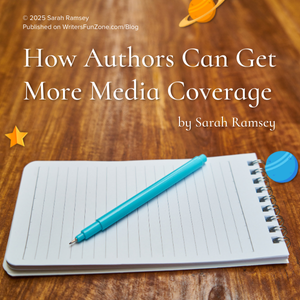 Today we welcome a new guest writer to Writer’s Fun Zone, Sarah Ramsey who is stopping by to chat with us about “How Authors Can Get More Media Coverage.” Enjoy!
Today we welcome a new guest writer to Writer’s Fun Zone, Sarah Ramsey who is stopping by to chat with us about “How Authors Can Get More Media Coverage.” Enjoy!
***
Putting words together is something writers do because it’s what we feel compelled to do.
Publishing those words – selling them in exchange for sweet, sweet money that funds extravagant lifestyle choices like rent, health insurance, and cat food – is something we do because it’s our business.
And like any business, every author can use media coverage to increase their name recognition and sell more books.
Why does an author need to do media to sell books?
Media relations is primarily about name recognition and establishing authority.
Someone who might ignore an ad instead sees your name in a news article and they are more likely to remember and trust you.
Most of us who consume media are hardwired to put more authority in people we see in that media.
Media coverage is also helpful if you want to build a presence outside of your books.
If you are interested in speaking at conferences or writing a column for a newspaper, media coverage helps you build social proof that you are good at connecting with broader audiences.
How To Increase Your Earned Media CoverageThere are two ways you can proactively seek media coverage: by sending out a press release or by pitching a story to a reporter.
But most press releases and story pitches don’t get used – a recent survey found that the response rate to unsolicited pitches is just over 3 percent. (And that’s every kind of response, even the negative ones.)
To increase your chance of getting media coverage, do these three things: start local, be relevant, and make it easy on the reporter.
Start Local And Scale UpAlmost no one starts with coverage in the Wall Street Journal or New York Times (and if your first media mention is in an international paper, it’s probably not for a good reason).
The best place to start is with the reporters in your neighborhood.
Most towns have at least one free weekly or monthly paper, and if you live in a bigger city, your neighborhood may have one as well.
You might also find weekly or monthly publications targeted to specific interest groups or populations.
Many regions also have magazines that focus on regional cultural stories. If you don’t find a print version, look for the online versions.
Your local news outlets are constantly looking for local stories to cover, so make sure to invite them to readings and book signings especially if those events also support local businesses or libraries
To submit a press release or story pitch, look for a dedicated email or form, usually on the About Us or Meet Our Team page.
You can also look for the editor, news desk, or assignment editor’s contact information.
Be Relevant And TimelyThe top reason reporters give for not using a press release or story pitch is that it’s not relevant.
If you’re not getting coverage from your release or pitches, it’s likely because the reporter can’t use what you’re sending.
Put yourself in the mind of the reporter’s audience – what would be newsworthy to them?
It might not be simply that you have a new book out, but instead that a local author with a background in a local industry has a new book set in a particular place of interest or historical era important to that community.
Or maybe your book is a perfect spooky but cozy read they could feature for Halloween books.
Timing is important, too. If you want a news story to appear in the May issue of a monthly print publication, you need to get it to them in March (possibly earlier for book reviews).
For daily or digital publications, or for television or radio, a week is reasonable.
If you send news after the fact – for example, that you published a book last month – it likely won’t be used because it’s not timely.
You would need to find some kind of new and interesting hook to make it fresh and timely.
Make It Easy On The ReporterReporters get something like 50 pitches every week, plus assignments from their editors and breaking news to cover.
So if you want a reporter to cover your work, make it easy on them.
First, don’t send attachments in your emails. Those messages often get caught in spam filters and reporters can’t cover what they don’t know about.
Paste the text of your release in your email and add a one or two sentence note at the top.
Second, keep your pitches and press releases short and to the point. Most press releases shouldn’t be longer than 600-700 words (and even those may be cut down if they get printed).
Pitches should be no more than three or four brief paragraphs.
Third, give the reporter a way to find photos or supporting material.
You can include the URL for your press kit or website where they can find pictures or graphics, such as your author photo and book cover, or you can offer to send them those items via their preferred method.
You can do it!
Media coverage will help you grow your name recognition and your audience, and while it might not lead to direct book sales it can help people remember you and find your books.
Engaging with the media doesn’t have to be time consuming or difficult. Remember to start local and build, keep it relevant, and make it easy on the reporter.
You can do it! But if you need a coach to walk you through the media relations process or write a press release for you and tell you where and how to send it, I can help. Sign up for my newsletter here and get a 10-step Press Release Checklist, plus great tips every month.
***
About the Author
Sarah Ramsey is the founder of Pitch PR. She offers PR coaching, media training, and done-for-you projects to help authors raise their profile and get more earned media coverage.
Connect with her at pitchpr.me or on social media:
Instagram: https://www.instagram.com/publicrelationspinchhitter
LinkedIn: https://www.linkedin.com/in/sarahbramsey
The post How Authors Can Get More Media Coverage by Sarah Ramsey appeared first on Writer's Fun Zone.
May 6, 2025
Why You Should Always Talk About Your Book by Kirsten McNeill
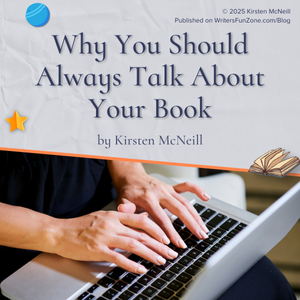 Let’s welcome back Kirsten McNeill as she shares with us “Why You Should Always Talk About Your Book” Enjoy!
Let’s welcome back Kirsten McNeill as she shares with us “Why You Should Always Talk About Your Book” Enjoy!
***
How often do you talk about your book?
Do you avoid sharing it because you’re afraid of judgement?
It’s normal to be nervous about people’s reactions, but I guarantee you are not talking about your book as much as you can be.
Talking about your writing journey is important.
It shows people what you’re passionate about. It lets them into your world and allows them to be excited with you.
Always assume that people are hearing you talk about your writing for the first time, every time.
People are bombarded with so much information daily, that they need repetition to remember which books they wanted to buy.
You might assume you’ve already told a certain loved one about your book, but how much did you actually say?
The Hurt ReactionI’ll give you the perfect example from my life.
I was at a family dinner, and eventually the conversation gave me the opportunity to mention my writing.
I had recently started writing the first draft of my health memoir and I wanted to celebrate that!
When I shared this information, one of my family members said, “Memoir? You can’t write a memoir, you’re not dead!”
How could they not know that I was writing a health memoir?
A different family member had been encouraging me to do it since 2020.
I’ve been outlining the journey for over three years now, recalling the events of my dislocated kneecap and cancer diagnosis.
So, how did this family member not know?
My instinct was to make a sarcastic joke in response. I said, “Dead people can’t write anyways!”
Sometimes when I’m hurt I can’t think of a good thing to say, and by the time I figure it out, the conversation moves on to something completely different.
Luckily, my brain processed the information faster than usual.
Instead of sulking silently, I explained the difference between memoirs, which shares one piece of someone’s life, and an autobiography, which shares the entirety of someone’s life.
Though I didn’t get a chance to explain why I was writing my health memoir, I’m glad I spoke up and shared more than I normally would.
The more I thought about it, the more I realized I hadn’t spoken to this particular person about my plans to write a memoir.
I’d talked to them a lot about the one I helped a friend write, called Escaping to Freedom, but how much had I mentioned the plan to write my own?
I may have said it in passing once or twice, but not enough to truly show how serious I was about using my story to inspire others.
I made an assumption about what I had told them and how much information they had retained.
People have busy lives, and they can’t always remember everything that you’re up to.
3 Tips for Talking About Your BookIf you want more practice speaking with people in your life about your book, try these:
Tip 1 — Ask QuestionsWith any conversation, sometimes people don’t have the capacity to fully engage with you. Before you go into a full description of your book, ask questions.
“Hey, can I tell you about the book I’m currently writing?”
“What have I told you so far about my latest book?”
“Can I practice pitching my book synopsis to you?”
Asking permission before you begin ensures people are more present in your conversation, therefore more likely to retain the information.
Tip 2 — Speak with ConfidenceYour book deserves your highest level of excitement.
Plan out a few key points that you want to mention every time you talk about your book.
Practicing this will reduce the amount of times you fumble over your words.
When you share your book with happiness, that energy will be reciprocated when you’re talking to your loved ones.
Even if they don’t read your genre, they love you, and knowing that you’re happy will also make them happy.
Tip 3 — Handle Criticism RespectfullyWhen you’re in the mood to celebrate, you are not in the mood for criticism.
Unfortunately, some people like to share criticism whether you ask for it or not.
If it’s a loved one, it’s usually coming from a good place. They want to help in the best way they know how.
But sometimes you only need a cheerleader, who offers 100% support.
During times of unsolicited criticism, try not to react in anger.
Practice a standard line you share when you want to calmly and respectfully reject the criticism, and end the conversation with that person.
Try something like:
“It’s okay if you can’t celebrate with me, but I would appreciate it if you withheld your criticism.”
“I appreciate that you care enough to want to help! When I’m ready for constructive criticism, I know I can count on you.”
Keep Moving ForwardNever stop talking about your books and writing experiences, because this is your passion.
Sharing this lets people know what you’re up to and gives you more practice and confidence for when you talk to book agents, publishers, or readers at book conventions.
Whenever you think you’ve talked about it enough, talk about it more. You never know what people remember about your book, and sometimes they need a reminder!
Even if you are talking about your book “too much,” the ones who love you won’t stop you.
They will enjoy hearing how passionate you are and feel happy as you light up talking about your work.
So, keep talking, keep writing, and…
Never forget that you are worthy!
***
ABOUT KIRSTEN MCNEILL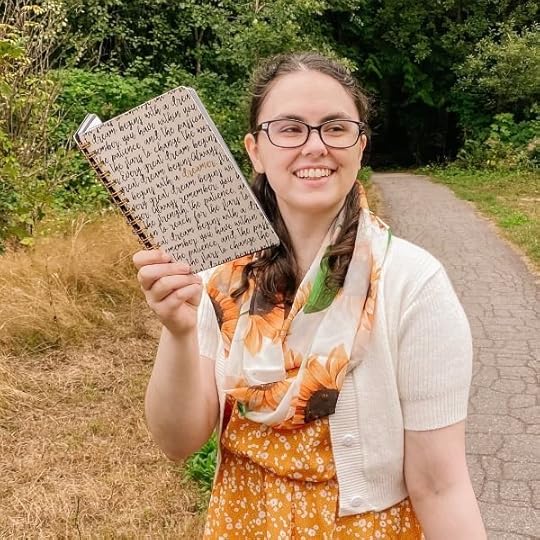 Kirsten McNeill is a Confidence & Writing Lifestyle Coach, Blogger, and Self-Published Writer. Her mission with Worthy Writers Coaching is to align you with your creative side through practical writing schedules and exploring your identity. Connect to your sunflower confidence to publish and share your stories with an empowered mindset.
Kirsten McNeill is a Confidence & Writing Lifestyle Coach, Blogger, and Self-Published Writer. Her mission with Worthy Writers Coaching is to align you with your creative side through practical writing schedules and exploring your identity. Connect to your sunflower confidence to publish and share your stories with an empowered mindset.
Download the FREE workbook Feed Your Horses Confidence Thought Exercise when you subscribe to the Worthy Writers Confidence Newsletter.
Instagram: www.instagram.com/confident.kirsten
Facebook Group: www.facebook.com/groups/theworthywritersnook
The post Why You Should Always Talk About Your Book by Kirsten McNeill appeared first on Writer's Fun Zone.
May 5, 2025
Writing Inclusive Fantasy for Modern Readers with Sci-Fi Fantasy Author, Aspry Jones
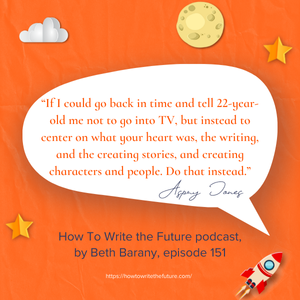
Writing Inclusive Fantasy for Modern Readers with Sci-Fi Fantasy Author, Aspry Jones – How To Write the Future podcast, episode 151
***
“If I could go back in time and tell 22-year-old me not to go into TV, but instead to center on what your heart was, the writing, and the creating stories, and creating characters and people. Do that instead.” — Aspry Jones
In this episode of the How To Write the Future podcast, host Beth Barany talks to sci-fi fantasy author Aspry Jones, about his writing journey from TV and comics to fantasy, including the importance of representing diversity in his characters. Together, they share the challenges of independent publishing, being a fan of science fiction, and the excitement of his debut novel, Protectors of the Light Crown.
Platforms The podcast is available on Apple Podcasts | Buzzsprout | Spotify | Podcast Addict | Amazon Music| YouTube
RESOURCESGET HELP WITH YOUR WORLD BUILDING – START HERE
Free World Building Workbook for Fiction Writers: https://writersfunzone.com/blog/world-building-resources/
Sign up for the 30-minute Story Success Clinic with Beth Barany: https://writersfunzone.com/blog/story-success-clinic/
Get support for your fiction writing by a novelist and writing teacher and coach. Schedule an exploratory call here and see if Beth can support you today: https://writersfunzone.com/blog/discovery-call/
About the How To Write the Future podcastThe How To Write The Future podcast is for science fiction and fantasy writers who want to write positive futures and successfully bring those stories out into the marketplace. Hosted by Beth Barany, science fiction novelist and creativity coach for writers. We cover tips for fiction writers. This podcast is for readers too if you’re at all curious about the future of humanity.
This podcast is for you if you have questions like:
– How do I create a believable world for my science fiction story?
– How do I figure out what’s not working if my story feels flat?
– How do I make my story more interesting and alive?
This podcast is for readers too if you’re at all curious about the future of humanity.
About Aspry Jones Broadcast TV industry veteran Aspry Jones, from Asbury Park, NJ hits the literary scene. Growing up a comic book geek and chronic TV watcher, it was a given for this author to seek a career in television. Having retired from the profession after 25 years, Aspry has returned to his first love, writing, with debut novel, “Protectors Of The Light Crown.”
Broadcast TV industry veteran Aspry Jones, from Asbury Park, NJ hits the literary scene. Growing up a comic book geek and chronic TV watcher, it was a given for this author to seek a career in television. Having retired from the profession after 25 years, Aspry has returned to his first love, writing, with debut novel, “Protectors Of The Light Crown.”
Website: http://aspryjones.com
Instagram: https://www.instagram.com/asprywrites/
Facebook: https://www.facebook.com/aspry.jones
Transcript for Writing Inclusive Fantasy for Modern Readers with sci-fi fantasy author, Aspry JonesWelcome everyone to How to Write the Future. I’m your host, Beth Barany. I am a writing teacher, creativity coach, speaker, podcaster, and novelist.
I love science, fiction and fantasy, and I have this podcast to bring in resources for writers and anyone who cares about the future because I believe with creativity and our imaginations, we can help shape a better world for everyone.
[00:24] Guest Introduction: Aspry JonesI’m so excited to have a special guest with me today, sci-fi fantasy novelist, Aspry Jones Aspry, welcome. So glad you’re here.
Hi Beth. Thank you very much for having me. I’m very excited.
Excellent. So everyone gets an understanding of who you are. I’m gonna read your awesome bio that you sent me.
Get to know Aspry. Broadcast TV industry veteran Aspry Jones from Asbury Park, New Jersey hits the literary scene. Growing up, a comic book geek and chronic TV watcher, it was a given for this author to seek a career in television. Having retired from the profession. After 25 years, Aspry has returned to his first love, writing, with his debut novel, Protectors of The Light Crown. And for those of you watching on YouTube, you will see his book displayed in front of him. Looks like an amazing book.
[01:18] Aspry’s Writing JourneyAspry, why don’t we start off by you telling us a little bit about this novel, like our bite-sized littlebook description of what this story is about.
Fantasy books are pretty much mostly all the same: a few unlikely characters get together, become friends, and they try to kill the devil. My book is no different than that, but, I throw in what I like to call, a few curve balls because my story is based around the multiverse.
And, it’s in its own particular universe itself, unlike ours, but very much like ours. There are subtle differences and there is a character named Dexter Park, and Dexter can visit different universes in his dreams, and the story starts out based around him and gradually becomes a thing where he becomes part of a team who eventually evolved into the Protectors, meaning superheroes in their world. And, they try to kill the devil. Like I said, the venomous wretch, an ancient demon who used to be a king, and he is wrecking havoc all over their world, and they have to stop it.
Oh, wow. Sounds like such an adventure.
So when did you first start writing? Everyone always wants to know this question, right? I get it as well.
I was a huge comic book geek, so I started out writing my own comic books and drawing them too. I have a short background in art and sketching. And I actually interviewed for being an artist for Harris Comics. I don’t know if you are aware of Van Perella? I had a friend of mine named Louis Small. He was a penciler for Harris Comics and he got me an interview and that interview was my first foray into humiliation.
As it turned out, that I was nowhere near as goodas I thought I was. And so instead of centering on sketching and drawing, I centered on the writing aspect of basically from the poetry comic books that I made myself. I never wanted to get into, novel writing. I never wanted to get into anything that demanded a huge commitment. I’ve written screenplays that didn’t really go anywhere.
But, eventually after my years in television, I realized that if I could go back in time. This is “how to write the past” in this particular case. If I could go back in time and tell 22-year-old me not to go into TV, but instead to center on what your heart was, the writing and the creating stories and creating characters and people. Do that instead.
Wow.
I’m trying to catch up now.
Yeah. Yeah. It’s so interesting what we would tell our younger selves.
[04:02] Diversity in Fantasy WritingAnd what about fantasy? Why fantasy? What brought you to this genre?
You know what, I’m gonna go deep on that. I could give you the short answer, but, I think the longer answer is stronger.
As a comic book fan, there’s a gentleman who was a comic book artist and he used to create characters. He created characters like Black Lightning, Black Goliath. See where I’m going with this? When he was a kid, he would talk to his black friends and they would discuss how, wow, I wish there were more characters in comic books that looked like me.
So I had those same feelings. Sure. We had Black Panther, we had Luke Cage, but we’re talking about 5% here out, out of a hundred percent. And, the heroes by and large were white males. And they were incredible.
They were great. And I loved them to death, and I still do, but there was something missing there. And the same thing is happening and has been happening in fantasy.
So I was trying to be an agent of change. I said to myself, I prefer fiction, well over nonfiction, autobiographies, things like that.
What I love to read is the creativity coming out of somebody’s head.
And what I want to do is add characters of color into the world of fantasy that you’re not going to find in Lord of the Rings. You’re not going to find in the Belgariad. You’re not going to find in Harry Potter. Not really. And then go further than that.
I have a gay character. I have an elderly character. I have the rich, I have the poor, I have a Native American angel, or in that universe, what passes as the Native American .
I try to cover some more bases so that when somebody reads my novel, they can say to themselves, wow, this character looks like me, and I would appreciate that. I would love that. That’s what I’m trying to do. So I chose fantasy as my outlet for that expression.
I love it. I love it so much. Really reflecting the diversity of humanity, what humanity really looks like and not this narrow slice.Yeah. Love that. And really for me, writing my Henrietta the Dragon Slayer stories was about putting a girl in an adventure and all that I read as a kid were boys going on adventures. I’m like, where’s the girl? And now I’m adapting that into short film and it turns out that my actors are Asian American, just landed up that way and some interesting reasons. And I’m just loving it, loving the energy, loving the change, loving thinking about the rest of my stories and bringing in a diverse cast for that.
And also my crew is already very diverse and, loving that, and wanting, craving it, craving all the different perspectives and voices. And, it inspires me as a reader and also as a writer. So I’m really glad that you’re doing that.
I took some pages from some female writers that I came across and I decided, I was like, you know what I’m gonna do in my book?
I’m going to make the main character, which is a black male. I’m going to make him the weakest guy on the team, and the strongest one on the team is going to be female. So I tried to do a little bit of that myself.
Thank you. Thank you. I appreciate that. And I’m sure a lot of girls do too.
[07:02] Writing Process and Daily RoutineI’m infinitely curious about this. Tell us a little bit about your writing process, in terms of your daily practice as well as anything– I don’t know — anything that surprised you? I’m curious, how do you go about shaping your writing life? And what works for you?
When I’m ready to write, I’m rolling. I don’t need motivation. I don’t need help. I just sit down and I just keep grooving to it. I just bop my head to that music and I am in the process right now of gathering the appropriate inspiration to begin book two, the Protectors of the Light Crown. This is the beginning. It’s a trilogy. I knew my ending when I wrote the beginning. So what makes sense to me before I start writing is that outline every single chapter. So that I can line up certain things that flow; so that I can plant seeds for the next book in the book that I’m writing, so that I can plant Easter eggs for people who want to reread the story. They can go back and be like, I love that.
Some people have told me that they did that, and it was a very cool experience and I love hearing that. So what I do when I’ve outlined the entire story is I just sit down and at chapter one I’m off to the races.There’s nothing stopping me, and I just keep on writing and it feels good. I see those people who talk about having writer’s block and they can’t come up with certain, things to do with their characters and stuff like that.
I’m so lucky that way. I don’t have those problems. Once I do my outline, I can just skate and it feels great. Luckily for me, I’m in a blessed situation where I don’t have to go out and do a nine to five. Especially now, my profession, my job, my whole thing. My career is novelist now, so I can focus on that. And the only thing that’s really, demanding any of my outside attention is my dog, who is an angel. And that’s her name.
Aw Angel, that’s so wonderful. and do you write every day, all day, part of the day?
You gotta take the dog for a walk. how do you divide up your writing time? Are you a nighttime writer, morning writer, or midday writer?
Oh, wow. You know what?
That’s a very good question. Whenever the feeling strikes, and I would try to do a chapter every sit down. But,when you come into my book, I can have some long chapters,12, 13 pages.So it’s not feasible for me to expect me to knock out a chapter in one sitting, but in two sittings, I can knock out a chapter and I would say that, about an hour and a half of writing is enough for one day.
Yeah, People always wanna know, especially beginning writers.
For comparison, yeah, I can write one to two hours a day sometimes, but sometimes I’m only writing for 15 or 20 minutes and I’m still making progress.
So I just wanna share with our listeners that, it doesn’t have to be an hour or two. It can be 15, 20 minutes and you can still make progress.
Now what’s that?
I have a lot of experience writing in 20-minute blocks.
Yeah. When I was first starting out writing blog posts, I would set the timer for 20 minutes just to see what I could get done because especially when I hadn’t written blog posts and I was just seeing what I could do. And when you try something new, sometimes setting a timer can make it feel less painful because you’re like, I don’t know what I’m doing, but let’s try it for 20 minutes. Who knows what will happen? And so I developed that practice for non-fiction and I brought it into the fiction space and I found it helped me, especially when I had a really busy mind. And it was hard to focus or hard to settle because I have a lot of things on my mind all the time.
And it would give me a sense of focus and I’ve done it so many times, I know that I could write 600 words in that amount of time about, and that’s two pages. That’s a little over two pages of prose or nonfiction.
And it just was a sense of accomplishment just because I run a business helping writers. And I’m a writer and I like to write in the middle of the day, which means there’s things before it and things after it. And it was just a way to focus and get stuff done, even in a busy life. So it’s a fun exercise.
I recommend it for folks. sometimes I tell beginning writers: write for five minutes. Stand in your kitchen while you’re heating up your coffee in the microwave and write and see what that’s like. Especially for beginners who don’t have the Insta write button that you have. And my husband has it too.
I didn’t have the Insta write button. I had to learn. but some people like you, like my husband, you can just sit down and boom, flows and that’s beautiful.
You hit me with that five minutes. That’s really something. How about try that?
Yeah, try that. You’re waiting in line,you’re on hold on the phone. And also dictation. I use dictation a lot, as well for nonfiction. I haven’t really done the dictation for fiction thing.Oh, my, I could never do that. That’s really not, that’s deep.
I’m so old school with this. I literally, I a notepad and a pen. That’s how I wrote Protectors of the Light Crown. That’s beautiful. And that’s probably why it took 10 years. it’s a lot of extra work. Do you do that?
I did it for Henrietta, the Dragon Slayer book one. Okay. As I hand wrote the whole thing, and then I dictated it into probably Microsoft Word and edited it there. But now I wanted to speed up the process, so now I go direct to typing.And, a lot of, verbal brainstorming sometimes my husband who’s a writer as well.
With a friend. yeah. Now I’m working on a script, that I was trying to dictate, but my dictation tool wasn’t working. So I’m typing it.
You gave me some things to think about.
Oh, good. I’m so glad.
[12:27] Awards and RecognitionSo have you won an award for your novel?
Yes. , I’m a very lucky
I think a lot of things just fall into my lap. I was playing around on the internet and I wasn’t even looking at the writing stuff, I’m aware of the Nobel Prize and the Pulitzer and things like that, but it didn’t dawn on me to enter a writing award contest.
So I was playing on the internet and I saw on the sidebar it was like, put your manuscript into our database. We’ll enter it into the content and they were the International Impact Book Awards. And, just like everybody else, the book awards got to eat.So they, there was a fee and, I paid the fee and I said, sure, I’ll enter your contest. And I won, which was amazing because, it is not like I have any self-doubt or anything. But, it was just so funny that it landed in my life the way it did, and I won for Best Fantasy Adventure.
And it’s pretty much what I’ve been looking forward to my entire life, honestly, since I was about 16. I’ve been published professionally since I was 16 years old, and, I always wanted to get on a stage and accept an award for my writing because– Any woman who says, wow, you’re a good looking man, that’s nice, but you know what I really wanna hear?I love your writing. That’s really good stuff. That’s what I wanna go through life people telling me. If I stand on a stage and accept an award, I feel really good that, people like the writing. Okay, great. And July 25th. I’m flying out to Phoenix, Arizona to get on stage and accept the award and, so forth and so on. There’s gonna be a TV interview. it’s a phenomenal experience and I couldn’t be more grateful.
I know what you mean. I won an award for Henrietta the Dragon Slayer Grand Prize in this California Indie Fiction Contest that I had no idea that I could win.
I did enter the book contest, but just having someone who, people who don’t know us, find our work gratifying. Yeah. so exciting.that’s such a pinnacle experience.And to happen so early, I’m
I’m an appreciative. I’m surfing on a cloud.
Yeah. Oh, that’s so wonderful. And from a marketing aspect, it does bring attention to your work. It does make people double consider your work. Like, Oh, that’s interesting. Oh, he won an award. It makes people lean in even more because it has what’s called third party endorsement, right?
People who don’t know you, who aren’t related to you said, wow, this book, check it out, people. This is an awesome book. So I just think it’s a beautiful opportunity.
And I also encourage writers to go for awards. it’s one of my marketing choices, I would say. And it’s so beautiful that it came to you like this and that you took action as well. That beautiful meeting of opportunity and action.
Yeah.
You know what? Nothing happens if you do nothing. You know what I mean?
That’s so true. It’s so true.
[15:16] Future Plans and MeditationAnd lastly, as we wrap up for today, tell us some of your future plans. I understand you have a second book in the works. And what else you got in the works?
I’m striking while the iron is hot, so I entered some more awards contests.I’m still flying with Protectors of the Light Crown. I just, got pushed through Ingram Spark. I was on Amazon all this time. So now, my book can be shuffled into \Walmart, Barnes and Noble, independent bookstores, so forth and so on.
And now I can get a much broader sense of exposure.After this, I’m gonna try to ride this horse as far as it’ll go, and then I’m gonna start book two. book two– it takes place somewhat later after this ends. And it has its own self-contained story while also following the flow of, events that were planted with Protectors.
So I’m going to do that. I’m almost done with the outline for that and it feels really good because I was a little bit stuck on my outline. I’m really huge on meditation. I’m an advanced meditator, so I was on my back deck and I was trying to search my mind fora great avenue that the book should pick.
And something just popped into my head and I’m very excited about getting it on paper because I think it’s a really great idea.
Oh, that is so exciting. Wonderful. I love that you’re an advanced meditator. I think having the quiet, and learning how to quiet our minds and really go deep within and listen to ourselves is so valuable.
Yeah, I think so too. I’m glad you said that. I’m a big believer in that, and for me, meditation comes through the form of walking. and, being aware of my surroundings and talking to nature And talking to the animals that come along my way.
Do you like to do it in nature?
Yeah, I like to be outside and connect to the plants. And I’m here in, Northern California, in Oakland, near San Francisco. And just lots of things are blooming and it’s actually through walking, not sitting,In my twenties I did a sitting meditation training and that was great, but there’s something about moving. ’cause I sit so much as a writer at the desk and on the Zoom and the editing and all the editing, both for the podcast and people’s manuscripts and my own work. So movement becomes a way to process, just release and get into the body, get outta the mind.
And be in the emotions, be appreciative of nature and everything around me and the people and even though this is an urban environment, it’s also lots and lots of plants, roses and, all the flowers blooming.
They say movement is a raisor of the vibration. Not to get overly woowoo on you guys. Hope we didn’t go off on a, left field tangent here, but I could talk about this stuff with you all day actually. I don’t talk about it with my many people.
I agree with you.
I have a quote on my wall from Einstein. “Creativity is intelligence in motion.”
I really feel writing is a physical act in my opinion, right? We got our hands on the keyboard or across the page, or even if we’re speaking, dictating.
And so to really get into the body and kinesthetic experience, emotional experience, and then to really be the channel to be creative, right? Creativity comes from, we don’t know, but to do this well, we have to work our instrument, which is our entire body. To me this is holistic and important and relevant .
Yeah, me too. It’s just that, I have learned from talking too much that it’s not for everybody. Not a lot of people will vibe with what you’re trying to express. You know what, you’re in California, you probably don’t have that experience.
Not here in Northern California.
I studied intuition when I was in my twenties. I At the Berkeley Psychic Institute, I did clairvoyant studies for a year. Wow. Talk about Woo. Yeah. And I came to my own conclusion that intuition is in the body. It’s our deep body knowing that we’ve lost touch of a lot of us.
And so I took it upon myself actually starting around age 19 to start to really pay attention to my body as a barometer for the simplest choices. And then later as I got serious about fiction, now I use it for fiction. And now I use it for everything so that I use my inner knowing, which is my body and mostly my gut.
‘Cause most people we have all these bacteria or microorganisms that live in our gut that run the show. They pretty much run the show, so pay attention to them and nurture the good ones and right. Eat healthy and exercise and good drinking habits, lots of water.
All these things feed our physical vessel so that we can be the awesome creative channels that we wanna be.
Oh, you talk my language.
So if you have any parting advice to beginning writers out there who are really wishing and wanting to have their novel out in the world. What advice do you have for them?
I would say that, there is beauty in independent publishing, self-publishing. It can take you a long way if you’re willing to put a lot intoI would say that, I would imagine that if I were taken up by a publisher with an agent, so forth and so on, things would go, have gone a lot easier for me, probably, but I also enjoy– , not that I’m a control freak or anything, but I have enjoyed the control that I’ve been able to enact in the entire start to finish with this thing. But there are rough spots. There are rough spots.
Be ready for things to go wrong and roll with the punches.
Be ready to accept the editor actually knows what they’re talking and it can be a lesson in humility to find that out. Be ready to get a bad publicist, be ready to spend some money,and have that money get thrown out the window. Be ready to spend some money and score because this whole thing is not going to run itself. It needs your help. You didn’t just write it. it’s the end of it, and it just walks off into the world of success on its own.
It’s going to need you to keep pushing and pushing. And I speak from experience, and maybe there are other people out there who have different stories to tell, and it went a lot easier.
But this was not an easy,cake to bake, but in the end. I couldn’t have been more happier because everything just fell into place on a lot of things the guy who did the artwork for this is named Cole Munro-Chitty, and I just happened to meet him in a dog park outta nowhere.
And I said, you’re an a graphic artist, aren’t you?And he said, yeah. I said, I need an anime feel for the cover of my book. And he showed me his stuff. Perfect. I was like, wow, that couldn’t have gone easier. So there are some things that actually fell right into place, but the bulk of it, it’ll make you sweat, it’ll make you cry, it’ll make you bleed.
Yeah, I’m right there with you As an independent, published author, it’s sometimes smooth sailing. Other times bumpy, but it’s all part of the process. So I have one last bonus question for you.
[22:09] Nerding Out: The Mandalorian and MoreI see you’ve got a helmet behind you. Looks like you know the Mandalorian there.
Yeah.
Yeah. Are you a big fan, the Mandalorian?
I’m a big fan of the Mandalorian.
I love the Mandalorian.
I love Marvel movies.
Falcon. Yeah, you came to see us. Alright. Hello Star Trek. Yeah.
Hello.
That’s my bat signal.
I went outta my way to be as nerdy as I possibly could be for this interview.
Oh, I love it. I love it.
[22:34] Conclusion and FarewellAspry, I wish you the best of luck. I’m now eager, very eager to read your novel.
Oh, that would be wonderful. Thank you very much.
Yeah, check out Aspry’s novel protectors of the Light Crown.
And if people wanna find you, what’s the one link that rules them all there in your world. @AspryWrites on social media. I have a website It’s AspryJones.com.
Beautiful. I was checking it out before our show. people can sign up for your newsletter. Get notified when your book comes out and all your awesome news. Aspry, I really wanna thank you so much for taking the time today to share your novel Protectors of the Light Crown with our How to Write the Future audience and, we’ll have to have you back when Book two comes out.
Magnificent. I would love to be back. You took good care of me. I appreciate you. Thanks.
Oh, you’re so welcome. So welcome. and I wish you all the best andwe’ll see you next time.
Absolutely.
All right. Take care. And that’s a wrap.
All right everyone. That’s it for this week. Write long and prosper.
Loved this episode? Leave us a review and rating here: https://www.buzzsprout.com/2012061Need instructions on how to leave a review? Go here.
***ABOUT BETH BARANYBeth Barany teaches science fiction and fantasy novelists how to write, edit, and publish their books as a coach, teacher, consultant, and developmental editor. She’s an award-winning fantasy and science fiction novelist and runs the podcast, “How To Write The Future.”
Learn more about Beth Barany at these sites:
Author site / Coaching site / School of Fiction / Writer’s Fun Zone blog
CONNECTContact Beth: https://writersfunzone.com/blog/podcast/#tve-jump-185b4422580
Email: beth@bethbarany.com
LinkedIn:https://www.linkedin.com/in/bethbarany/
IG: https://www.instagram.com/bethbarany/
TT: https://www.tiktok.com/@bethbarany/
FB: https://www.facebook.com/bethbarany
X: https://twitter.com/BethBarany
CREDITS EDITED WITH DESCRIPT: https://www.descript.com?lmref=_w1WCA (Refer-a-Friend link)MUSIC CREDITS : Music from Uppbeat (free for Creators!): https://uppbeat.io/t/soundroll/fuzz-buzz License code: UMMKDRL02DFGKJ0L. “Fuzz buzz” by Soundroll. Commercial license: https://musicvine.com/track/soundroll/fuzz-buzz.DISTRIBUTED BY BUZZSPROUT: https://www.buzzsprout.com/?referrer_id=1994465 (Refer-a-Friend link)SHOW PRODUCTION BY Beth BaranySHOW CO-PRODUCTION + NOTES by Kerry-Ann McDadeC 2025 BETH BARANY
For more “How To Write the Future” episodes, go here.
If you’d like to invite Beth onto your podcast, drop her a note here.
 Like the work we do? Tip us! https://ko-fi.com/bethbarany
Like the work we do? Tip us! https://ko-fi.com/bethbarany
The post Writing Inclusive Fantasy for Modern Readers with Sci-Fi Fantasy Author, Aspry Jones appeared first on Writer's Fun Zone.

